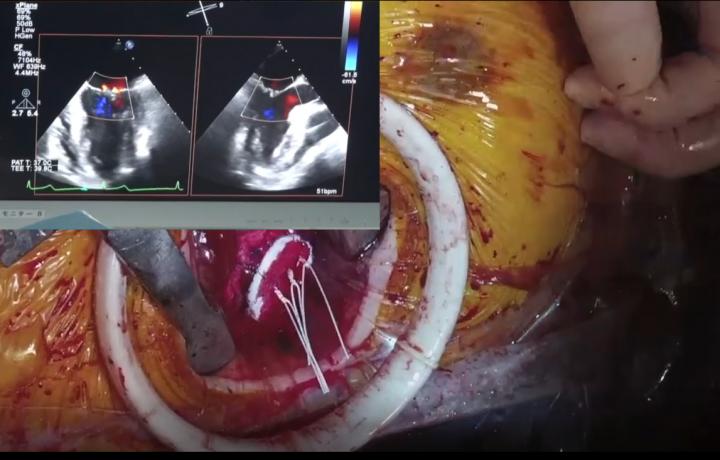
Credit: Osaka University
A group of researchers led by Professor Yoshiki SAWA of the Cardiovascular Group in the Graduate School of Medicine, Osaka University, succeeded in beating-heart surgery to repair a mitral valve.
They reconstructed the chordae tendineae using a guiding catheter to implant a mitral valve onto a beating heart through a small incision of about 4 cm in the left thorax. Conventionally, this type of surgery was performed using artificial heart lung apparatus because it was necessary to temporarily stop the heart.
Left untreated, severe mitral valve regurgitation can cause heart enlargement, arrhythmia, cardiac arrest, and pulmonary vascular congestion, so mitral valve replacement or mitral valve repair is required. Heart valve surgery is generally performed with open-heart surgery after cardioplegic solution is injected into the coronary vessels in order to temporarily stop the heart, imposing a heavy burden on patients. Because the use of artificial heart lung apparatus causes complications, such as brain infarction and temporarily reduced cardiac function, mitral valve surgery was performed only on patients with progressed symptoms and heart enlargement.
This group developed a wide variety of treatments for serious cardiac failure, such as skeletal myoblast cell sheet transplantation and regenerative medicine using iPS cells. They also made active efforts to promote minimally invasive heart surgery and, in 2009, they succeeded in Japan’s first transcatheter aortic valve implantation (TAVI), which does not cut open the patient’s chest and the heart is not stopped.
This time, as a new medical treatment, this group successfully performed Japan’s first beating mitral valve surgery using the advanced surgical repair technique NeoChord.
Since this treatment method has advantages due to the disuse of artificial heart lung apparatus, i.e., brain infarction and other complications can be avoided and more favorable and earlier postoperative recovery expected, it is a promising minimally invasive heart surgery with increased safety. It is helpful in treating patients who cannot undergo heart surgery using artificial lung apparatus because of chronic diseases and existing complications.
This treatment approach will develop minimally invasive heart surgery, improve patient safety, and eventually lead to early stage treatment and better prognosis of patients. It will allow for minimally invasive treatment on high-risk patients who were thought to be incurable by conventional mitral valve replacement.
###
About Osaka University
Osaka University was founded in 1931 as one of the seven imperial universities of Japan and now has expanded to one of Japan’s leading comprehensive universities. The University has now embarked on open research revolution from a position as Japan’s most innovative university and among the most innovative institutions in the world according to Reuters 2015 Top 100 Innovative Universities and the Nature Index Innovation 2017. The university’s ability to innovate from the stage of fundamental research through the creation of useful technology with economic impact stems from its broad disciplinary spectrum.
Website: https:/
Media Contact
Saori Obayashi
[email protected]
81-661-055-886
Original Source
https:/




